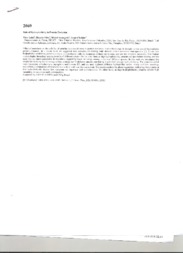Role of hydrophobicity in protein evolution.
Role of hydrophobicity in protein evolution.
Summary: Effect of mutations on the stability of proteins is a crucial issue in protein evolution. Such effects depend strongly on the overall hydrophobic protein character. In a recent work we suggested two scenarios for folding with distinct protein evolution consequences [1]. Under low hydrophobic conditions, proteins collapse concomitantly with the formation of their native state, and are less robust to mutations. This feature implies higher homology among proteins of different species. On the other limit, at high hydrophobicity, proteins collapse before folding, and this case they are more susceptible to mutations, suggesting lower homology among proteins of different species. In this work we investigate this conjecture studying the homology of four proteins for 41 different species, correlating it with their average hydrophobicity. The proteins studied were lysozyme, cytochrome-c, myoglobin and histone H3, and we used eighteen different hydrophobic scales. Along with the homology calculation, a comparison of structural similarity (rmsd) was also carried out. The results confirm the above suggestion, indicating that proteins at low hydrophobicity display low variations on sequences and conformations. On the other hand, at high hydrophobicity, proteins exhibit high variability on sequences and conformations.
Publication year: 2010
Types of publication: Abstract in annals or event proceedings
Observation
Some of Embrapa's publications are published as ePub files. To read them, use or download one of the following free software options to your computer or mobile device. Android: Google Play Books; IOS: iBooks; Windows and Linux: Calibre.
Access other publications
Access the Agricultural Research Database (BDPA) to consult Embrapa's full library collection and records.
Visit Embrapa Bookstore to purchase books and other publications sold by Embrapa.

